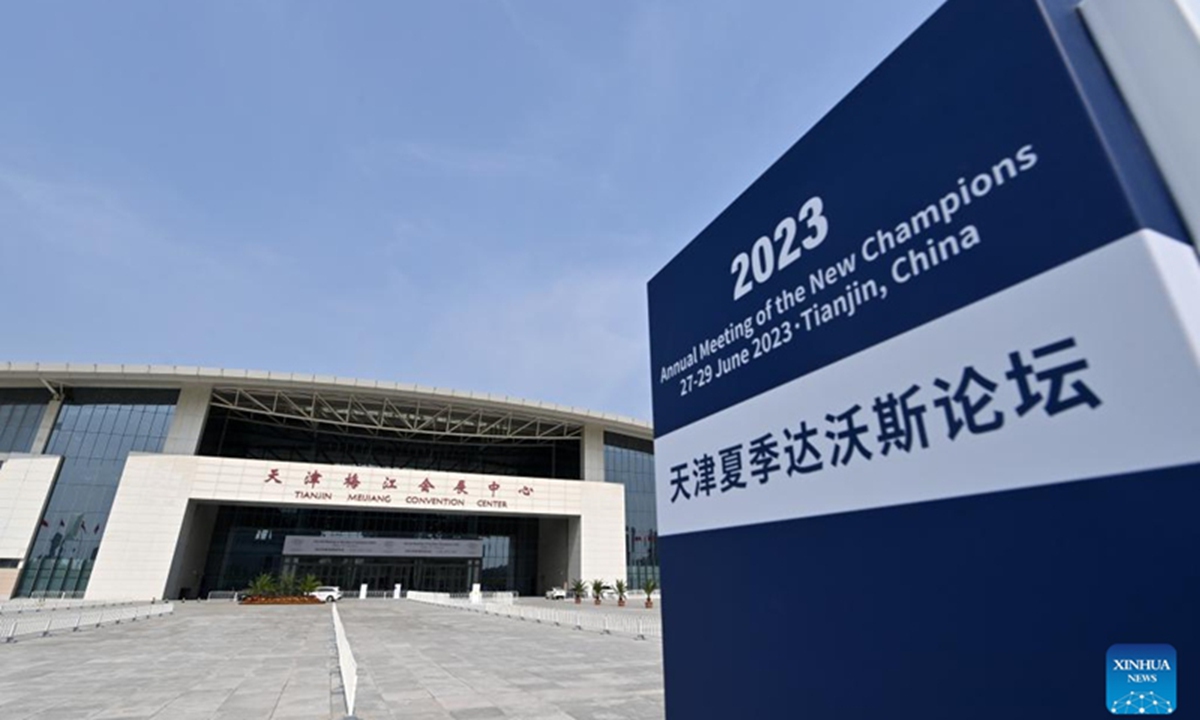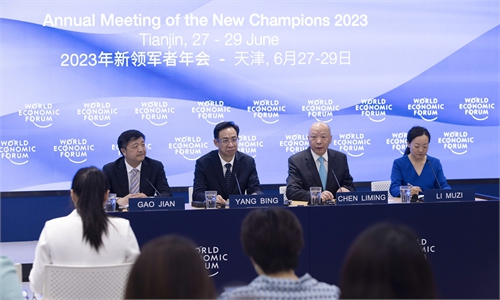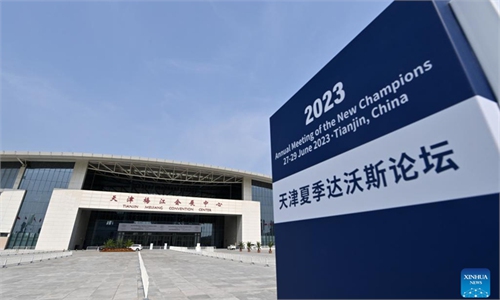
This photo taken on June 25, 2023 shows a view of the Tianjin Meijiang Convention Center, the venue for the 14th Annual Meeting of the New Champions, also known as the Summer Davos Forum, in north China's Tianjin Municipality. Photo: Xinhua
Chinese Premier Li Qiang delivered a keynote speech at the opening of the World Economic Forum's (WEF) 14th Annual Meeting of the New Champions, also known as Summer Davos, in North China's Tianjin on Tuesday, offering insight into how the global economy can navigate the turbulent times.Li called for win-win cooperation to tackle global challenges. Despite the headwinds, the development trend of economic globalization has kept moving forward, Li noted.
After a three-year hiatus of the in-person event due to the COVID-19 pandemic, this year's Summer Davos Forum sends a strong signal that various parties are keen to seek cooperation as crises continue to impact the global economy. Although some Western countries are attempting to demonize China and hype "de-risking" or "decoupling," more countries are willing to advance their cooperation with China.
About 1,500 participants from business, governments, international organizations and academia from nearly 100 countries and regions are attending the forum. Among them are Executive Chairman of the WEF Klaus Schwab, and other foreign dignitaries including Barbados Prime Minister Mia Amor Mottley, Mongolian Prime Minister Luvsannamsrai Oyun-Erdene, Prime Minister of New Zealand Chris Hipkins, Prime Minister of Vietnam Pham Minh Chinh, and Director-General of the World Trade Organization Ngozi Okonjo-Iweala.
Saudi Arabia has sent one of the biggest official delegations to this week's Summer Davos in China, as the two countries keep deepening economic and trade co-operation, according to the Financial Times.
The New Zealand prime minister's visit to China has also attracted widespread attention. This is the first visit to an Asian country since Hipkins took over as prime minister in January this year, and it is also the first visit to China by a New Zealand prime minister since 2019.
While many Western countries are under strategic pressure from US hegemony, New Zealand's pragmatic and independent China policy is worth mentioning. Being in the Western camp does not mean that a country has to follow the so-called de-risking approach and reduce economic dependence on China. Strengthening cooperation is the choice that is in line with its own economic development.
With regard to the trend of the world economy in the post-COVID era, all parties are full of expectations for the voices, signals and expectations of the Summer Davos Forum. The Chinese voice, Chinese ideas, and Chinese plans at the forum will attract worldwide attention.
It is certain that China will continue to provide strong dynamism to the world's economic recovery and growth. China will continue to expand its market and create cooperation opportunities for investors and businesses across the world, providing a constant driving force for the recovery and growth of the global economy.
China's average contribution to world economic growth from 2013 to 2021 was as high as 38.6 percent, exceeding the sum of the contributions of the G7 countries, according to a report released by the World Bank. Recently, international organizations and institutions such as the International Monetary Fund (IMF) have also raised their forecasts for China's economic growth this year, demonstrating their confidence in China's economic development prospects.
In the first quarter of this year, China's economy grew by 4.5 percent year-on-year, beating expectations. China's actual foreign direct investment (FDI) grew by 4.9 percent to 408.45 billion yuan ($58 billion) in the same period. Many foreign companies have been attracted by the huge development opportunities China's vast market presents.
The global economic situation is still very severe, given the aftershock of the pandemic, the conflict between Russia and Ukraine, and the tightening of monetary policy in the West. However, what is even more dangerous is that some Western countries are now distorting the facts, trying to portray China as a "risk" to incite other countries to reduce their economic dependence on China in the name of "de-risking."
It must be noted that protectionism simply cannot save any struggling economy. And politicizing economic issues can only lead to more severe economic difficulties. Currently, global economies need to strengthen cooperation, reduce barriers, and form a joint force for development.
With the theme of "Entrepreneurship: The Driving Force of the Global Economy," the forum is expected to further boost global economic cooperation. China is willing to work with entrepreneurs from all over the world to firmly support economic globalization and free trade, to lead the global economy out of the haze.
The author is a reporter with the Global Times. bizopinion@globaltimes.com.cn



